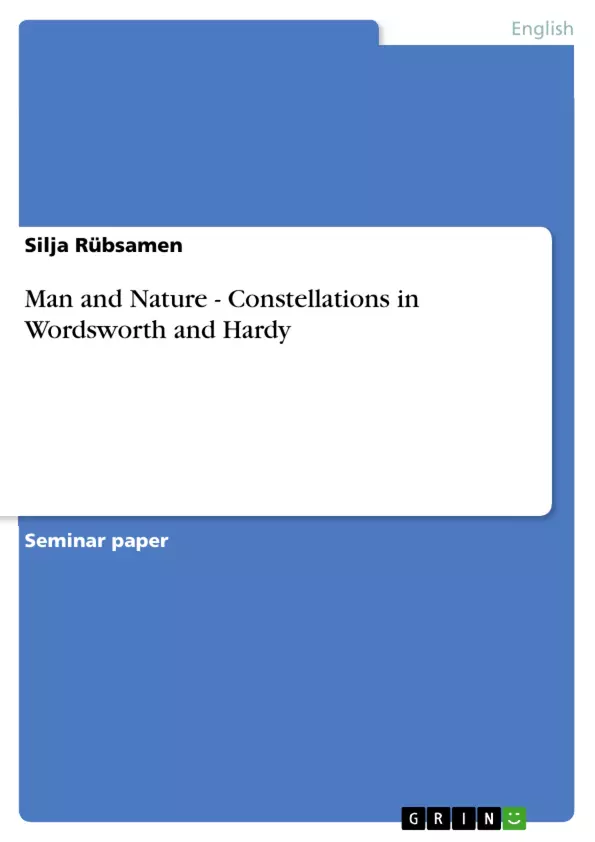I. Introduction:
“What a piece of work is a man, how noble in reason, how infinite in faculties, in form and in moving how express and admiable; in action how like an angel, in apprehension how like a god: the beauty of the world, the paragon of animals – and yet, to me, what is this quintessence of dust?”(1)
Throughout his work, Hardy seems to ask himself this question. Especially many of his late poems are dedicated to the question what the quintessence of dust, man, is in relation to nature, and to the elements he is composed of.
Pressing “against the limits of nineteenth century realist convention,”(2) Hardy’s concept of an essential identity of humanity and the rest of nature(3) enters into a new viewpoint that is incommensurate both to the realist approach to man and nature Hardy took in his novels, and to the Romantic approach that took the form of a “sentimental nature pantheism [which] was often made a surrogate for lost faith.”(4) The purpose of this paper will be an analysis of essential features in two poems by Thomas Hardy, “Voices of Things Growing in a Churchyard” and “Nature’s Questioning” that express Hardy’s concept of nature and its relationship to man, and a short comparison of these features with the concept of nature and human life expressed in Romantic poetry, most notably in Wordsworth’s poetry. The poems chosen here are the five “Lucy” poems written in Germany in 1799, which are fitting because they contain a combination of topics we can also encounter in Hardy’s poems: nature and man, and the unavoidable link of them by death, which indicates an overall equality of “this quintessence of dust” and the nature it derives its existence from.
[...]
_____
1 Hamlet, II,2 327-332.
2 Peter Widdowson: Thomas Hardy. Plymouth, 1996.
3 James O. Bailey: The Poetry of Thomas Hardy. University of North Carolina Press, 1970. p. 462. [...]
4 Edward Wagenknecht: “Art is Long and Time is Fleeting.” In: Henry Wadsworth Longfellow [...]
Inhaltsverzeichnis (Table of Contents)
- I. Introduction
- II. Argument
Zielsetzung und Themenschwerpunkte (Objectives and Key Themes)
This paper analyzes the concept of nature and its relationship to humanity in two poems by Thomas Hardy, "Voices of Things Growing in a Churchyard" and "Nature's Questioning," and compares these features with the concept of nature and human life expressed in Romantic poetry, particularly Wordsworth's poetry.
- Hardy's concept of an essential identity of humanity and nature
- The differences between the Romantic view of nature and Hardy's deistic concept
- The Romantic interpretation of natural sounds as utterances of a spirited entity
- The evolution of nature as a language in Romantic poetry
- Nature's divine power of creation and destruction in Wordsworth's "Lucy" poems
Zusammenfassung der Kapitel (Chapter Summaries)
I. Introduction
This chapter introduces the main question that Hardy seems to ask throughout his work: what is the quintessence of dust, man, in relation to nature? The chapter also introduces the concept of nature and its relationship to man in Hardy's poetry, comparing it to the Romantic approach.
II. Argument
This chapter delves into the Romantic interpretation of nature as a larger entity, drawing upon the works of Schelling, Byron, and Shelley. It also examines the treatment of natural sounds as language in early nineteenth-century poetry and how it reflects a shift from the concept of nature as a means of speaking to nature as an independently speaking entity.
The chapter then focuses on Wordsworth's "Lucy" poems, specifically "Three years she grew in sun and shower," which exemplifies nature's direct creative influence on human beings. It explores the concept of nature's creative and destructive powers and how they relate to the birth and death of Lucy.
Schlüsselwörter (Keywords)
This paper explores key concepts such as nature, humanity, Romantic poetry, Hardy's poetry, deism, pantheism, natural sounds as language, creative and destructive powers of nature, and Wordsworth's "Lucy" poems.
Frequently Asked Questions
What is Thomas Hardy's view on the relationship between man and nature?
Hardy posits an essential identity between humanity and nature, viewing man as a "quintessence of dust" inextricably linked to the natural elements through both life and death.
How does Hardy's concept of nature differ from Romantic pantheism?
Unlike the sentimental nature pantheism of the Romantics, which often served as a surrogate for lost faith, Hardy's approach is more deistic and aligned with 19th-century realism.
What is the significance of natural sounds in Romantic poetry?
Romantic poets often interpreted natural sounds as the utterances of a spirited, independently speaking entity, reflecting a shift in how nature was perceived as a language.
Which Wordsworth poems are used for comparison in this paper?
The paper focuses on the five "Lucy" poems written in 1799, particularly "Three years she grew in sun and shower," to illustrate nature's creative and destructive powers.
What themes are explored in Hardy's "Voices of Things Growing in a Churchyard"?
The poem explores the unavoidable link between man and nature through death and the idea that human identity is ultimately absorbed back into the natural world.
How is nature portrayed as a creative force in Wordsworth's "Lucy" poems?
Nature is depicted as a divine power that directly influences the growth, beauty, and eventual death of the character Lucy, acting as both a mother and a sovereign.
- Quote paper
- Silja Rübsamen (Author), 2001, Man and Nature - Constellations in Wordsworth and Hardy, Munich, GRIN Verlag, https://www.grin.com/document/3085



